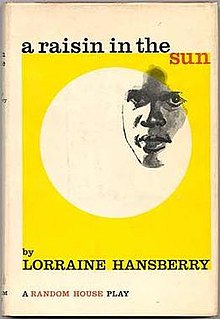A Raisin in the Sun
| A Raisin in the Sun | |
|---|---|

First-edition publication (Random House 1959)
|
|
| Written by | Lorraine Vivian Hansberry |
| Characters |
|
| Date premiered | March 11, 1959 |
| Place premiered | Ethel Barrymore Theatre |
| Original language | English |
| Genre | Domestic tragedy |
| Setting | South Side, Chicago |
A Raisin in the Sun is a play by Lorraine Hansberry that debuted on Broadway in 1959. The title comes from the poem "Harlem" (also known as "A Dream Deferred") by Langston Hughes. The story tells of a black family's experiences in the Washington Park Subdivision of Chicago's Woodlawn neighborhood as they attempt to "better" themselves with an insurance payout following the death of the father. The New York Drama Critics' Circle named it the best play of 1959.
Walter and Ruth Younger, their son Travis, along with Walter's mother Lena (Mama) and Walter's sister Beneatha, live in poverty in a dilapidated two-bedroom apartment on Chicago's south side. Walter is barely making a living as a limousine driver. Though Ruth is content with their lot, Walter is not and desperately wishes to become wealthy. His plan is to invest in a liquor store in partnership with Willy and Bobo, street-smart acquaintances of Walter's.
At the beginning of the play, Walter and Beneatha's father has recently died, and Mama is waiting for a life insurance check for $10,000. Walter has a sense of entitlement to the money, but Mama has religious objections to alcohol and Beneatha has to remind him it is Mama's call how to spend it. Eventually Mama puts some of the money down on a new house, choosing an all-white neighborhood over a black one for the practical reason that it happens to be much cheaper. Later she relents and gives the rest of the money to Walter to invest with the provision that he reserve $3,000 for Beneatha's education. Walter passes the money on to Willy's naive sidekick Bobo, who gives it to Willy, who absconds with it, depriving Walter and Beneatha of their dreams, though not the Youngers of their new home. Meanwhile, Karl Lindner, a white representative of the neighborhood they plan to move to, makes a generous offer to buy them out. He wishes to avoid neighborhood tensions over interracial population, which to the three women's horror Walter prepares to accept as a solution to their financial setback. Lena says that while money was something they try to work for, they should never take it if it was a person's way of telling them they weren't fit to walk the same earth as them.
While all this is going on, Beneatha's character and direction in life are being defined for us by two different men: Beneatha's wealthy and educated boyfriend George Murchison, and Joseph Asagai. Neither man is actively involved in the Youngers' financial ups and downs. George represents the "fully assimilated black man" who denies his African heritage with a "smarter than thou" attitude, which Beneatha finds disgusting, while dismissively mocking Walter's lack of money and education. Asagai patiently teaches Beneatha about her African heritage; he gives her thoughtfully useful gifts from Africa, while pointing out she is unwittingly assimilating herself into white ways. She straightens her hair, for example, which he characterizes as "mutilation."
...
Wikipedia
